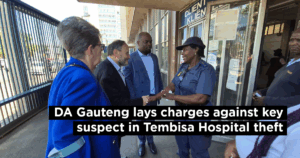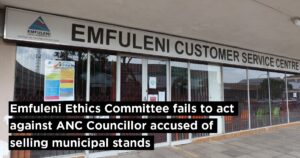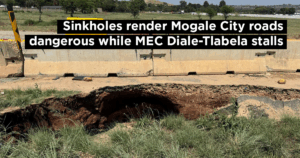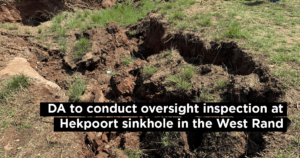Gauteng residents have endured the pain of empty promises, failed service delivery and false proclamations under the leadership of the Premier, Panyaza Lesufi. His populist strategy has misled the residents, who were made to believe that under his leadership of the Government of Provincial Unity (GPU), strides were going to be made to improve their lives.
As the leader of the GPU, Lesufi has excelled mainly in arrogance, broken promises, and denialism. His administration does not appear to be prepared with solutions for the major challenges Gauteng faces, such as a severe water crisis, overcrowded schools, and hospitals that are not able to provide surgeries or cancer treatment for patients in need.
Every year that Lesufi has delivered a State of the Province Address (SOPA), he has boasted and made bold promises about improving the living conditions of residents through the creation of employment opportunities, growing the economy, fixing the infrastructure, providing social welfare services, quality education and healthcare services and most importantly fighting crime. Premier Lesufi has failed to realise that pies in the sky don’t translate to service delivery on the ground. We have heard enough of his unrealistic promises, which lack proper implementation.
The Gauteng economy is suffering, and investors are not comfortable investing in it due to numerous challenges that Lesufi’s government has failed to address. The casing point is his promises to clamp down on corruption and crime so that the economy can grow, yet he refuses to release crucial reports that would implicate officials and politicians involved in maladministration and corruption the extent of corruption. His pet project of Amapanyaza only costs taxpayers money rather than protecting them from criminals.
The unemployment rate continues to soar in Gauteng, with 2,593,000 unemployed residents and 572,000 discouraged job seekers. This is according to the Quarterly Labour Force Survey (QLFS) for the third quarter of 2024, which highlighted that Gauteng had a 34.0% unemployment rate and that we have lost 66,000 jobs. These are not just numbers; these are people who are being denied the opportunity to support their families and lift themselves out of the ravages of poverty.
Poverty and unemployment continue to grow despite Lesufi’s bold promises to grow the economy and create a conducive environment to attract investors, who will create more job opportunities and reduce the unemployment rate.
We need to question what happened to these promises. Was there no plan in place? If there were plans, were these left to collect dust? What have the members of Lesufi’s executive been doing to realise these promises?
I want to break down all the failed promises meant to create employment opportunities and boost the economy.
Nasi Ispani programme
Through his failed Nasi Ispani programme which was an election ploy that failed , Lesufi promised to create employment opportunities, but instead, he misled Gauteng residents with short-term jobs that were not sustainable. Many beneficiaries of the Nasi Ispani programme have been left stranded without being paid their salaries on time, some not even getting paid, while others have had their contracts terminated without notice. There were 32,000 teacher assistants employed on a contractual basis through the Nasi Ispani programme who were left destitute after Premier Lesufi could not keep his promises to them. The recruits were originally appointed on a one-year contract, with Lesufi promising a twelve-month extension of these contracts. However, the recruits were informed that their contracts had been terminated. The DA has referred this matter to the Public Protector for investigation to assist these teachers whose dreams have been shattered by Lesufi’s empty promises.
Economic development
Premier Lesufi promised the Gauteng residents that his government would focus on the Special Economic Zones (SEZ) and the revitalisation of industrial parks. This was another empty promise, as many SEZs are not operating properly. Last month, the DA Gauteng
Spokesperson for Economic Development, Nazley Sharif MPL, conducted oversight inspections of different industrial parks in Eldorado Park, Ennerdale, Orlando, Pennyville, and Dobsonville. We discovered that the industrial parks have turned into junk yards and haven for criminal elements due to a lack of proper and regular maintenance and management with some of these units hijacked by elements illegally demanding rentals. Despite that, the Department of Economic Development spent more than R134 million between 2015 and 2018 in maintaining the industrial parks in Gauteng.
Lesufi promised that the distribution centres would assist township spaza shops to stock their goods in bulk and be able to compete with other businesses. The reality is that the township spaza shops are suffering despite the existence of Lesufi’s distribution centres as they run out of stock. Last week, DA’s Sharif MPL also conducted an oversight at the Thokoza distribution centre in Ekurhuleni the shelves were empty despite millions of taxpayers’ money being spent on these centres. This hinders the growth of the township economy and limits employment opportunities.
Furthermore, Gauteng township businesses are struggling to survive and compete in the market due to the failure of the Township Economy Development Act, which was meant to facilitate and promote inclusive economic growth. This is the reason why the DA supported the Act. This Act failed to deliver on its mandate and is currently under review. It was not an enabling Act to address the challenges faced by the entrepreneurs and small businesses in the township and had no regulations.
The state of the economy has also affected the tourism industry, as we have witnessed a decline in the following areas: In the 2023/24 period, Gauteng reported a total of 7 534 924 overnight trips, marking an 8.0% decrease compared to previous figures. The overnight holiday trips fell sharply by 30.8%, totalling 2 318 305. Gauteng faced notable declines in domestic tourism spending. The province’s overnight tourism expenditure plummeted to R18.86 billion, indicating a decrease of 45.8%. In addition, holiday spending in Gauteng fell significantly to R7.22 billion, reflecting a sharp drop of 59.2%. This is a clear indication that their #VisitGAUTENGZwakala campaign is failing like many of their catch phrases with no impact. The issues such as an unstable economy, crime, corruption and crumbling infrastructure severely affect the tourist industry.
Premier Lesufi promised to provide reliable internet and access to free Wi-Fi in the townships and that all public institutions, schools, healthcare facilities and state offices will have dependable Wi-Fi. This was welcomed as a relief by all residents, considering the high and often unaffordable data costs. It was going to make it easier to communicate, seek employment opportunities, study and operate businesses. However, this has never materialised, as 95% of schools in Gauteng still do not have classroom connectivity. The Gauteng Broadband Network (GBN) has not yet been fully rolled out across the province. Many residents still struggle to access the internet. E-Government has constantly underperformed in its targets on Wide Area Network (WAN), Local Area Network (LAN) coverage of sites and VOIP.
He has also failed to keep his promise of fighting corruption. He has denied our appeal to release 177 forensic reports. Lesufi continues to protect corrupt politicians and officials implicated in these reports. By so doing, corruption will continue unabated because there is no room to act on and implement the recommendations stated in these reports.
During his last SOPA, the Premier stated that the lifestyle audits on all heads of departments and CEOs of the Gauteng Provincial Government (GPG) agencies have been completed. To date, we have not seen the outcomes; what is the Premier hiding? Why is he shielding corrupt officials? We need answers.
Road Infrastructure
For our economy to grow, we must invest in our road infrastructure to enable the transportation of goods to and from our province. Lesufi’s government has constantly failed to spend the road maintenance budget, which has resulted in budget cuts. The Gauteng Department of Roads and Logistics had its maintenance budget cut by R297,550,000 in the recent adjustment budget. This happens despite the fact that 149 provincial traffic lights are not functioning, creating safety risks for pedestrians and motorists. Lesufi is proud of himself for scrapping the e-tolls by overburdening Gauteng residents who are now forced to pay for something they were never consulted about.
The DA Gauteng has a tangible solution to help grow our economy and boost investor confidence. We would address the pressing matters that potential investors complain about, namely, crime, corruption and crumbling infrastructure. A DA government will immediately clamp down on corruption by making all forensic investigations public and implementing all the recommendations. Whistleblowers will be provided with proper protection. Crime and improved service delivery will be intensely prioritised. By doing so, investor confidence will be boosted. Only then will there be more job opportunities for the residents of this province? A DA government will conduct regular lifestyle audits and make the results of the audit public. Furthermore, only officials and MECs fit for duty will be appointed. By doing so, the residents of this province will receive the service delivery they deserve.
Fighting crime and illegal mining
In 2023, Lesufi made grand promises to make crime an apex priority through a five-year Gauteng Policing Plan and increasing resources to police stations. He reiterated this in 2024, stating that the Gauteng Provincial Government has donated 250 high-powered vehicles to the SAPS to enhance crime fighting within communities. However, between July and September last year, more than 1,500 people were murdered in Gauteng. During this period, 2 171 rape cases were reported to the police, the highest number of
any province in the country. To date, Gauteng only has 143 police stations responsible for the safety of more than 16 million people. Many police stations are poorly maintained, lack sufficient staff, and are under-resourced. This indicates that crime is not a priority in Gauteng, contrary to what has been suggested. The promises made by Lesufi have proven to be nothing more than empty words.
Furthermore, in 2023, Lesufi introduced the Gauteng Crime Prevention Wardens (CPWs), popularly known as Amapanyaza, with the promise that they would assist in combating crime in Gauteng communities. The Crime Prevention Wardens (CPWs) are deployed 24/7 in various wards and crime hotspots under the supervision of the South African Police Service (SAPS), Gauteng Traffic, and Metro Police Departments. Some CPWs are undergoing specialised training in firearm competence, drone piloting, crowd control, advanced driving, and addressing anti-land invasion and infrastructure vandalism. Others will monitor cameras in three interim command centres. Despite the deployment of these wardens, Gauteng remained the province with the highest number of contact crimes, at a reported 42,738. The province also leads in crime categories such as carjacking, residential robbery, and kidnapping in the incidents in the second quarter of 2024.
The DA Gauteng through its Shadow MEC for Community Safety, Crezane Bosch, has consistently highlighted the lack of training among these wardens, asserting that instead of protecting our communities, many of them are causing panic and havoc. In 2023, the Amapanyaza reportedly crashed 22 brand-new BMWs assigned to them for patrolling, with three of these vehicles being written off. In August of last year, a video circulated showing members of the CPW assaulting a woman at a shopping centre without provocation.
The DA Gauteng provincial government will reduce crime by implementing successful programmes like the LEAP programme in the Western Cape, which aims to increase police presence. Unlike the Amapanyaza, individuals involved in this program are properly trained and do not abuse state resources and the authority given to them.
In 2024, Lesufi said that over 7,000 CCTV cameras are working in an integrated, collaborative manner to make our province safer. These cameras were made possible through partnerships with Business Against Crime, SANRAL, VumaCam, and Tinstwalo (a partner from Ekurhuleni Municipality). The Premier also led the launch of CCTV cameras in Small Street Johannesburg as part of the Gauteng government’s intervention in the fight against crime and lawlessness in the Joburg CBD. Despite these CCTV initiatives, Gauteng residents continue to be in danger of serious crimes. This was confirmed by Hawks Head Godfrey Lebeya, stating that Gauteng, the country’s most populous province, has retained its lead as the hub for serious crime in the first quarter of the 2024/2025 financial year. Premier Lesufi’s technology-driven crime-fighting initiatives, such as the implementation of such as CCTV cameras, are not achieving the desired impact in addressing crime in the province.
At the beginning of 2024, Lesufi promised that from 1 April 2024, the people of Gauteng will be allowed to use the e-Panic button to seek help in terms of crime or medical challenges. We were told that the Gauteng government could not start with the deployment of an e-panic button at the end of the 2023/2024 financial year as planned due to a much-needed enhancement of the scope, which delayed the procurement process. However, the Gauteng Department of e-Government did not meet its target of deploying e-panic buttons, with only 2,000 out of a targeted 40,000 deployed in the first quarter of the 2024/2025 financial year.
In 2022, Lesufi also promised to fight crime with technology. He promised that his administration would buy 1800 drones. The Department of Community Safety has confirmed that only thirty-three (33) drones were acquired in the 2023/2024 financial year, far fewer than the promised 1800. Out of the 33 drones, just one has been registered with the South African Civil Aviation Authority (SACAA). The failure to register these drones, let alone use them, is unacceptable. It shows that the Gauteng government’s significant investment in advanced technology has not yielded much return for Gauteng residents. Furthermore, the flagging of the R10.8 million for the procurement of these drones as irregular expenditure under assessment in the department’s 2023/24 Annual Report is concerning. It signals a total disregard for sound financial management to achieve targeted goals for fighting crime.
The Integrated Provincial Command Centre continues to be an invisible giant within the Community Safety Department. Conceptualised to function as a central hub for real-time coordination among law enforcement agencies, security services, community forums, and emergency services, it aims to promote a more efficient and proactive approach to crime prevention and response. However, for the residents of Gauteng, it remains an unfulfilled aspiration. It is troubling that the centre has been on the budget for over five years without tangible progress. We will keep hearing about this ambitious initiative, but information will be limited regarding why it has not progressed and whether it will ever come to fruition in our lifetime. All the while, Gauteng remains unsafe, and criminals are roaming our streets unbothered by Lesufi’s all-talk and no-action approach to fighting crime.
For too long, the DA Gauteng has emphasised that effective crime prevention requires the Gauteng government to first address fundamental issues. This includes providing all police stations with essential resources, such as vehicles, personnel, and adequate infrastructure, to combat crime effectively. We have also called for the devolution of policing powers from the national to the provincial level. Gauteng residents should not continue to be fed empty promises about fighting serious crimes while they are increasingly feeling unsafe and disillusioned by unfulfilled commitments. They need solutions that effectively prevent and combat crime.
In 2024, Lesufi stated that the decisive response by the President to his administration’s request to address the challenges of illegal mining in derelict mines had brought a marked decrease in this abhorrent activity in the province. He assured Gauteng residents
that the weekly high-intensity joint “Okae Molao” and “Shanela” operations on illegal mining conducted across the province by SAPS, SANDF, GTP, Wardens (CPWs) and Private Security companies are producing results. However, the reality on the ground suggests that this is not entirely true. In October 2024, two deceased bodies were discovered in an illegal mine shaft near De Deur, south of Johannesburg. Meanwhile, questions linger about what happened to the seven illegal miners at an abandoned gold mine in Daggafontein, Springs, who reportedly died after unidentified chemicals were allegedly hurled at them by the police during an operation. These incidents highlight the law enforcement gaps in addressing illegal mining activities.
The DA Gauteng Spokesperson, Michael Sun, has long urged the Gauteng government to establish a dedicated specialised crime-busting unit to combat illegal mining and its devastating consequences effectively. This specialised unit would conduct regular patrols, particularly at derelict mining sites, to deter criminal activities and safeguard vulnerable areas from becoming crime hotspots. A DA Gauteng government would urgently establish a specialised police unit to tackle illegal mining. This unit would not only exist on paper but would be provided with the resources and firepower needed to end this scourge.
Township Informal Settlements and Hostels (TISH)
Lesufi has consistently highlighted his commitment to transforming townships, informal settlements, and hostels since he took office in 2022. Yet, many hostel residents are still facing living conditions that are not only inhumane but also endanger their health and safety. To exacerbate the situation, Lesufi is avoiding accountability regarding the necessary redevelopments of these hostels. In his oral reply to questions posed by Mervyn Cirota MPL, DA Gauteng Shadow MEC for Human Settlements, during a Gauteng Provincial Legislature sitting in February 2024, Lesufi stated that Madala Hostel is not one of the six hostels overseen by the Gauteng Provincial Government and that the DA should inquire with the City of Johannesburg as to why things are not improving in this hostel. This, of course, is not true. Hostels such as Madala, Sethokga, and Thokoza—all of which the DA has inspected in recent years—are among the 65 hostels under the Hostel Redevelopment Programme spearheaded by the Gauteng Department of Human Settlements and Infrastructure Development. Therefore, it is unclear why the Premier selectively chooses when to accept responsibility for improving conditions in Gauteng hostels.
The Premier’s response shows that his administration has abandoned its strategy to convert existing hostel units into family units and integrate their residents into the wider community to foster social cohesion and unity. His administration is preoccupied with installing CCTVs and Wi-Fi in six hostels, while the rest remain dilapidated and unfit for human habitation.
The DA Gauteng has been pushing for all levels of government to work together to improve living conditions in hostels. We have also demanded that where there are temporary homes like those rolled out during the COVID-19 pandemic, residents be allocated with immediate effect.
Human Settlements
The need of formalised housing is a severe challenge in Gauteng as seen through the ever-growing of the housing waiting list that has exceeded to over 1.2 million.
The situation with hostels is made worse by the fact that the Gauteng Department of Human Settlements (GDHS) has 45 housing projects, initiated as far back as 2008, that remain blocked and incomplete, according to MEC Tasneem Motara. One of the main reasons cited for each abandoned project in Gauteng is poor contractor performance, which has led to contract terminations. This situation represents a missed opportunity to address the housing challenges in Gauteng, which are becoming increasingly urgent, with residents expressing their frustration.
Evert Du Plessis, the DA Gauteng Spokesperson for Human Settlements, has been highlighting the Gauteng Department of Human Settlements’ lack of capacity and expertise in effectively addressing the province’s housing challenges. He has proposed that the department hire skilled leadership and engage the private sector to improve housing delivery while ensuring accountability for its failures. Without this change, the mega projects introduced by successive ANC premiers will fail to benefit Gauteng’s residents—some of whom have been waiting since 1996 for a place they can truly call home.
Substance abuse
In the 2023 SOPA, Lesufi committed to expanding drug rehabilitation facilities and increasing bed capacity to address the rising need for the rehabilitation of drug and substance abusers in Gauteng. He announced plans to add 1,351 new beds to drug rehabilitation centres. However, this commitment appears to have been reversed. According to a report by GroundUp, the Gauteng Department of Social Development (GDSD) has chosen to defund more than half of its existing inpatient drug rehabilitation capacity in the province. For the 2023/24 financial year, the department funded 571 beds across 13 NPOs. However, in the 2024/25 financial year, five organisations, which account for 246 of these beds, will no longer receive funding. These organisations—Westview Clinic Empilweni Treatment Centre, Golden Harvest Treatment Centre, Freedom Recovery Centre, and Jamela Rehabilitation Centre—have provided inpatient treatment for several years but have not received subsidies since the end of the last financial year. Surely, defunding treatment centre beds without a plan to replace them does not prioritise substance abuse treatment. Additionally, underspending over R160 million allocated for Substance Abuse, Prevention, and Rehabilitation is equally problematic.
The DA Shadow MEC for Social Development, Refiloe Nt’sekhe MPL, has been holding the former MEC for Social Development, Mbali Hlophe, and the current MEC, Faith Mazibuko, accountable for the “reprioritisation” of funds that have nearly devastated the welfare sector. This term serves as a euphemism for defunding essential programmes such as those for elderly persons with disabilities and children and HIV/AIDS, all in the name of financing Lesufi’s substance abuse and poverty alleviation initiatives.
If Lesufi is genuinely committed to combating substance abuse, why is he cutting funding for treatment centres? The answer is clear: this is not about prioritising substance abuse and poverty alleviation; rather, it appears to be an elaborate plan to take resources from the poor and vulnerable residents of Gauteng.
Eradicating hunger and food insecurity
During the 2024 SOPA, Lesufi announced plans to launch an e-indigent register aimed at enhancing his administration’s rapid response to urban hunger. He stated that all impoverished individuals in our province will be able to register to access the pro-poor basket. Additionally, we are reviving the pro-poor basket specifically for our children. To date, no e-indigent register has been launched. Furthermore, Lesufi, in the same SOPA, announced the Ending Urban Hunger through a Child initiative through which children will receive toiletries like soap, dignity packs and preventative pills, free data, seeds to plant vegetables, monthly food parcels, free unlimited data at their households.
The promises made by Lesufi have not led to any meaningful action, leaving vulnerable people in Gauteng struggling to get regular meals. During a visit to the Phomolong Day Care on Mandela Day in 2024, Refiloe Nt’sekhe MPL, Shadow MEC for Social Development, discovered that the facility was struggling to feed the elderly and was on the verge of closure due to a lack of funding. On that day, the elderly were served traditional “seven colours” meals, but it was a bittersweet moment for Nt’sekhe. She witnessed two elderly individuals taking just a few bites of their food and packing the rest into plastic containers, uncertain where their next meal would come from. While this situation is shocking, it is not surprising. This is the same department that the DA Gauteng exposed through its oversight assessment for funding food banks to support their operations and compensate workers for distributing food parcels while failing to replenish the banks that had dried up in December 2023.
Health and Wellness
In February 2024, Lesufi announced that Gauteng would buy 18 private hospitals through a public-private partnership to prepare for the National Health Insurance (NHI). He stated that this would help to increase the capacity of our healthcare system in the province. According to a statement by the Office of the Premier, this would be achieved
through a collaborative effort between the public and private sectors, facilitated through the Workers Investment Portfolio. The statement further stated that the GPG has formalised agreements to convert these hospitals into public healthcare facilities. To date, Gauteng residents have not been told which hospitals he is referring to and how this will be funded. Professor Alex Van den Heever critiques Lesufi’s claim that the government would buy back 18 hospitals, pointing out that there is no record of the Gauteng department buying private hospitals. He highlights a misunderstanding of the National Health Insurance (NHI) scheme, which allows contracting private hospitals without departmental ownership. Echoing the DA Gauteng MEC for Health, Jack Bloom MPL notes that the Gauteng government doesn’t have the funds for such a purchase and suggests it would be more practical to improve existing hospitals rather than spend R7.2 billion on buying assets.
On the same day, the Gauteng government announced plans to implement a Health Information System (HIS) aimed at establishing a “one patient, one file” approach. However, this initiative has been discussed for years without significant progress. The DA Bloom has noted that it has been a recurring topic throughout his 30 years as a DA representative in the Gauteng Provincial Legislature. The long history of failed computerisation attempts includes the Health Smart Card that Brian Hlongwa promised over 15 years ago. Likewise, the Auditor-General has found that the provincial health system has not maintained proper records as required by the National Health Act and treasury regulations. Additionally, data on primary health care services has not been validated against manual records, resulting in unreliable performance information since the audits conducted in 2014/15. To date, only the administrative component of the HIS has been implemented. This confirms what the DA Gauteng’s Jack Bloom has been saying: the Gauteng Department of Health “doesn’t have the skills to modernise effectively.”
There is also the issue of incompetent and corrupt individuals remaining in the head office. Babita Deokaran tried to bring change, but she was tragically murdered. A crucial part of the solution is having a different political party in power—one that prioritises merit over party loyalty and actively eliminates incompetence and corruption. The Democratic Alliance embodies this approach.
Education
In the 2023 SOPA, Lesufi announced that to address the severe overcrowding in schools, especially among Grade 1 and Grade 8 learners frequently left without placements, the Gauteng government has allocated R6 billion from its provincial budget. This funding will be used to construct new schools in areas with high-demand communities, aiming to create sufficient learning spaces for all learners and to prevent future placement issues. Despite this promise, Gauteng learners continue to learn in overcrowded classrooms that deprive them of the opportunity to flourish and develop their unique potential. This was discovered by Sergio Isa Dos Santos MPL, DA Gauteng Shadow MEC for Education, during a series of oversight visits to assess school readiness since the beginning of 2025.
He found that Cosmo City Junior Primary School is facing severe overcrowding, with a Grade 1 class having 92 learners and a Grade 2 class having 87 learners. The DA Gauteng has long expressed concerns about the lack of infrastructure and the poor maintenance of existing facilities in our schools. We have also been advocating for immediate action regarding the distribution of mobile classrooms. The pressing question remains: Where are the 4,000 satellite schools that the Gauteng Department of Education (GDE) promised to address overcrowding in our schools?
The GDE and Department of Infrastructure Development (DID)are not only failing to build the schools Lesufi promised but also lagging behind in getting rid of asbestos schools. A recent departmental report reveals that nine years after initial promises were made, 29 schools in Gauteng are built entirely or predominantly from asbestos, posing a serious risk to the health and safety of learners. The ongoing use of asbestos violates the 2013 Basic Education norms and standards for public infrastructure. These regulations mandated the replacement of schools constructed with inappropriate materials such as mud, wood, metal, or asbestos by 29 November 2016. The DA MPL, Dos Santos, has written to the GDE demanding comprehensive timelines for the complete eradication of asbestos structures in all affected schools, a detailed plan to overcome the challenges posed by contractor non-performance and community disruptions, and accountability and transparency in the handling of these projects, with regular updates to the public and stakeholders. The responses have not been inspiring, and the DA Gauteng is going to the market to solicit proposals from private companies to build these schools.
Johannesburg Forensic Pathology Centre
“We are pleased to report that the construction of the state-of-the-art Johannesburg Forensic Pathology Centre is at 95% completion with a scheduled practical completion by the 15th of December this year,” Lesufi said during the August 2024 SOPA. As of now, the over R500 million Johannesburg forensic pathology laboratory remains unfinished, four years past its expected completion date. This facility is intended to be the largest in Africa and is designed to help the South African Police Service address the DNA backlog crisis. The Gauteng Department of Infrastructure has stated that the primary issue leading to the delays has been the poor performance of the professional consultants involved in the project.
DA MPL Jack Bloom has cited this as another example of the notorious incompetence of the DID, which hardly ever completes a project on schedule and within budget. He has also pointed to corruption as a factor as fishy contractors, who are unable to finish the job, are often selected and then replaced at an extra expense. To address this issue, he has suggested shutting down the DID and replacing it with a competent entity that can complete the projects.
Implementing Anti-Land-Invasion Strategy
In 2023, Lesufi pledged to carry out the Anti-Land-Invasion Strategy to prevent the establishment of new informal settlements. He assured that starting from 1 September 2024, there would be no further land invasions in Gauteng. He said that the Gauteng government is in the process of forming an anti-land invasion unit to protect all land in Gauteng and ensure that no one occupies land that they do not legally possess. As of early 2025, there have been reports of persistent land invasions in Gauteng. An illustration of this issue is Tswelopele Secondary School, where learners are forced to attend overcrowded classrooms. A case in point is Tswelopele Secondary School, where learners are being compelled to learn in overcrowded classrooms because individuals have invaded the school-land, hindering plans to build new classrooms and alleviate overcrowding. Following the oversight inspection that brought this to light, Khathutshelo Rasilingwane MPL, DA Gauteng Spokesperson for Infrastructure Development, wrote to the MEC for Education, Matome Chiloane, and the MEC for Human Settlements, Tasneem Motara, seeking a comprehensive explanation for the lack of action taken to resolve this persistent issue. The DA Gauteng is also working with the local authorities in Ekurhuleni to follow up on this matter.
Reclaiming Hijacked and Abandoned Buildings
During a recent media briefing, Lesufi presented a report of his government’s first 100 days in office. He announced that the Gauteng government plans to hold a summit with potential investors to encourage them to invest in the Johannesburg CBD. Premier Lesufi also highlighted that the City of Joburg has over 180 hijacked buildings in the inner city, some city-owned. He emphasised that revitalising the Johannesburg CBD and addressing the hijacked buildings is a priority for the GPU. The Democratic Alliance (DA) has submitted questions to the Gauteng Department of Human Settlements and the Department of Cooperative Governance and Traditional Affairs (COGTA) to ascertain the steps the government will be taking to address the issue of building hijackings and the associated dangers. We eagerly await their responses; however, with how things are going, significant change is not on the horizon.
Blue Light Unit to Deal with Fake Blue Lights
In the 2023 SOPA, Lesufi acknowledged the increasing abuse of fake blue lights in Gauteng. He announced the formation of a special unit aimed at eliminating this issue. However, this initiative was not mentioned in the recent annual report of the Department of Community Safety, suggesting that the promise has not been translated into concrete action. As a result, innocent motorists and road users in Gauteng continue to be threatened by vehicles equipped with unauthorised emergency lights, leading to serious accidents while the Gauteng Traffic Police struggle to address the problem. Michael Sun MPL, the DA Gauteng Spokesperson for Community Safety, has condemned this reckless behaviour, which not only endangers public safety but also diminishes trust in legitimate emergency services. DA MPL Sun has called for urgent action from both the Gauteng
Traffic Police and the South African Police Service (SAPS) to crack down on the unlawful use and installation of emergency lights on vehicles in the province.
Solution to Track Stolen Guns
In February 2023, Lesufi informed the residents of Gauteng in his State of the Province Address that the Gauteng government had developed a solution to assist in tracking stolen firearms and locating them throughout the country. To date, not a single provincial police firearm has been successfully tracked despite an ambitious goal of reaching 1,000. This gap highlights the department’s lack of commitment to ensuring monitoring and accountability, and Lesufi refuses to give a designated MEC for reasons known only to him.
Conclusion
What I have laid out above is evidence that Premier Lesufi’s governance has been characterised by grand announcements and empty promises rather than meaningful action and delivery. His administration has stumbled from one debacle to another, from failed job creation programmes to deteriorating infrastructure, from rising crime to collapsing healthcare services. The minority government led by Lesufi has not improved the lives of Gauteng residents.
We must no longer tolerate being served pompous rhetoric instead of concrete change. The residents of Gauteng deserve a government that is action rather than talk, substance rather than form, and delivery-oriented rather than feeding the troughs of cadres.
As the Democratic Alliance, we have a record of effective service delivery, transparent governance, and economic growth where we govern. Gauteng residents have two paths ahead of them. One is the current path of broken promises and general decay. The second path is a future of accountable leadership and progress that will uplift the province’s residents.









